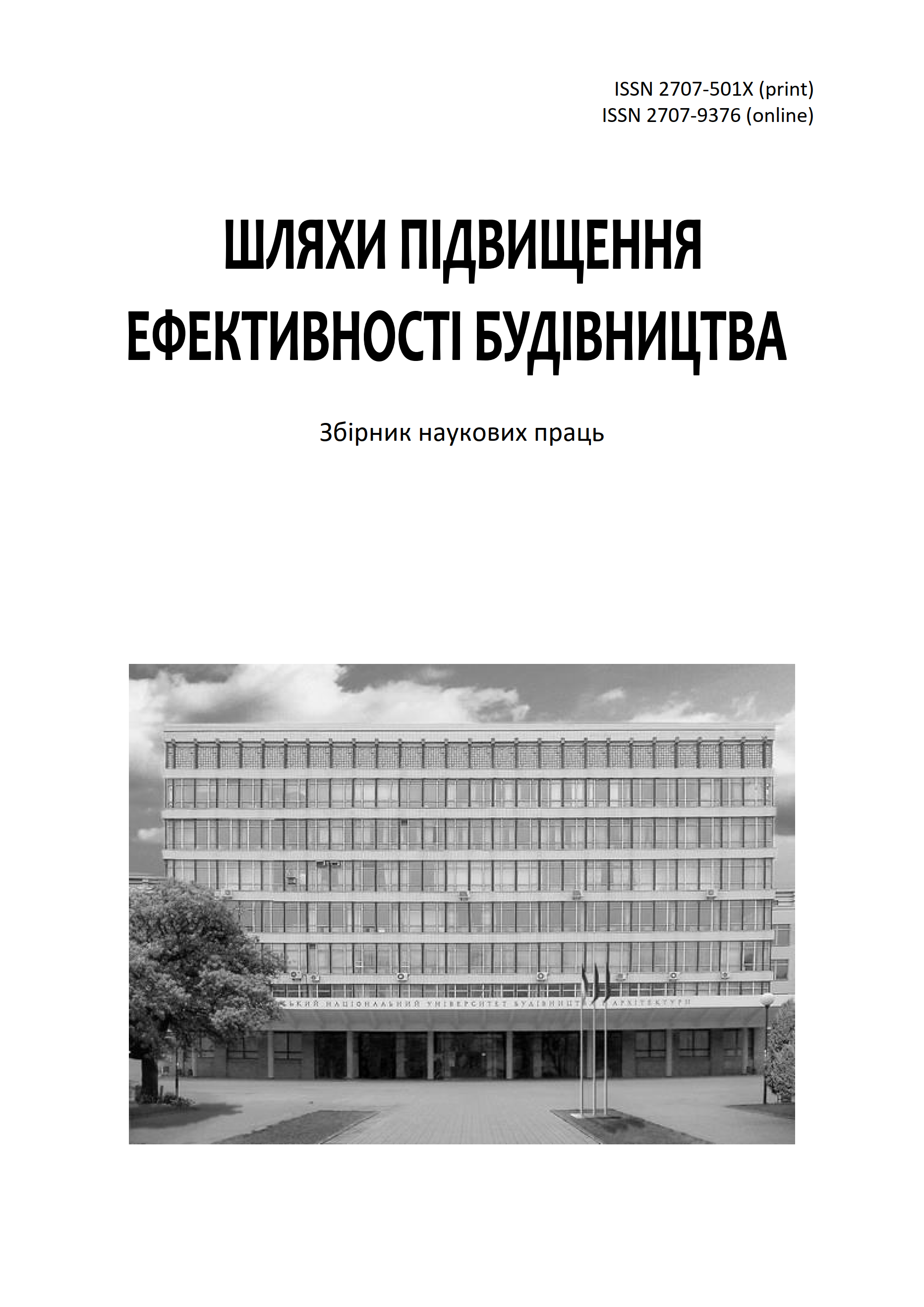Institutional principles of digitalization of the construction industry
Keywords:
institute, institutional environment, digital economy, digitalization, constructionAbstract
It has been proven that the use of digital technologies in the construction industry allows to automate and optimize the processes of design, planning and management of construction production. This leads to a reduction in the time and costs of work, as well as an increase in the quality and safety of construction objects. An analysis of the global and domestic practice of using digital technologies in the construction industry was carried out. The conditions under which the digitization process is organized and the factors that limit the development of the digital potential of the construction industry are determined.
The available potential for the development of information technologies and the introduction of their products and services, as well as the readiness of construction enterprises for digitalization of business, was determined. At the same time, a number of factors are identified that limit the development of the digital potential of the construction complex and are formed as a result of the minimization of organizational and institutional initiatives of the authorities, the low level of development of the digital economy sector in the country, and the imperfection of the current regulatory and legal support.
It was found that the regulation of the use of BIM technologies in design and construction tasks is evidence of a two-way motivation for the transition to BIM, both from the point of view of business institutions and from the state side, especially at the regional level during the development of the digital potential of the country's construction complex. The exclusivity and objective influence of the institutional environment of digitalization of construction on the formation of the digital economy, which is based on the development of digital infrastructure and requires the formation of modern institutional support, has been proven.
The system of forming the institutional environment of digitalization of construction is substantiated, covering economic, ecological, social, cultural, regulatory and political tools for the development of digital technologies in the construction industry, forming a system of social-production, financial-economic and regulatory relationships. During the study of the institutional environment that was formed in the construction industry of the country during the transformation processes in the digital economy and other spheres of human activity, the influence of formal and informal institutions on the effectiveness of the functioning of construction entities is revealed.
It is argued that the institutional environment for the development of the digital economy in the construction industry is the basis that forms and influences the symbiosis of economic entities, consumers, and the state with the innovative environment and directs the vector of institutional transformations in the field of information technologies..
References
Shkuratov O., Khokhuliak O., Kushniruk T. The role of land resources in the financial provision of rural areas of Ukraine. Scientific Papers: Series Management, Economic Engineering in Agriculture and Rural Development. 2022. Vol. 22. Issue 3. P. 643–648.
Veblen, T. The Theory of the Leisure Class. 1st Edition. New York: Routledge, 1992. 282 р.
Норт Д. Інституції, інституційна зміна та функціонування економіки: пер. з англ. / Д. Норт; пер. з англ. під ред. І. Дзюб. К.: Основи, 2000. 198 с.
Ткач А.А. Інституціональна економіка. Нова інституціональна економічна теорія. К.: Центр учбової літератури, 2007. 304 с.
Про схвалення Концепції розвитку цифрової економіки та суспільства України на 2018–2020 рр. та затвердження плану заходів щодо її реалізації: розпорядження КМУ від 17.01.2018 р. № 67-р. URL: http://zakon.rada. gov.ua/laws/show/67-2018-%D1%80.
Закон України від 15.07.2021 № 1667-IX «Про стимулювання розвитку цифрової економіки в Україні» URL: http://zakon.rada. gov.ua/
Digital riser report 2021. European Center for Digital Competitiveness. URL: https://digital-competitiveness.eu/digitalriser/ (дата звернення: 17.10.2023)
Brumana R. et al. Survey and scan to BIM model for the knowledge of built heritage and the management of conservation activities. Digital Transformation of the Design, Construction and Management Processes of the Built Environment. 2020. P. 391-400.
Про схвалення Концепції впровадження технологій будівельного інформаційного моделювання (ВІМ-технологій) в Україні та затвердження плану заходів з її реалізації: розпорядження КМУ від 17 лютого 2021 р. № 152-р. URL: http://zakon.rada. gov.ua/
Zulkefli N., Mohd-Rahim F., Zainon N. Integrating building information modelling (BIM) and sustainability to greening existing building: Potentials in malaysian construction industry // International Journal of Sustainable Construction Engineering and Technology. 2020. Vol. 11(3). P. 76-83.
Марченко О., Коляденко Р. Цифрова трансформація будівельного бізнесу: тенденції та перспективи. Цифрова економіка та економічна безпека. 2023. № 4(04). С. 20–26.
Чудовська В.А. Гармонізація функціонування формальних та неформальних інститутів органічного виробництва. Збалансоване природокористування. 2012. № 2. С. 93–98.
Downloads
Published
How to Cite
Issue
Section
License

This work is licensed under a Creative Commons Attribution 4.0 International License.
Authors who publish with this journal agree to the following terms:
- Authors retain copyright and grant the journal right of first publication with the work simultaneously licensed under a Creative Commons Attribution License that allows others to share the work with an acknowledgement of the work's authorship and initial publication in this journal.
- Authors are able to enter into separate, additional contractual arrangements for the non-exclusive distribution of the journal's published version of the work (e.g., post it to an institutional repository or publish it in a book), with an acknowledgement of its initial publication in this journal.
- Authors are permitted and encouraged to post their work online (e.g., in institutional repositories or on their website) prior to and during the submission process, as it can lead to productive exchanges, as well as earlier and greater citation of published work (See The Effect of Open Access).

